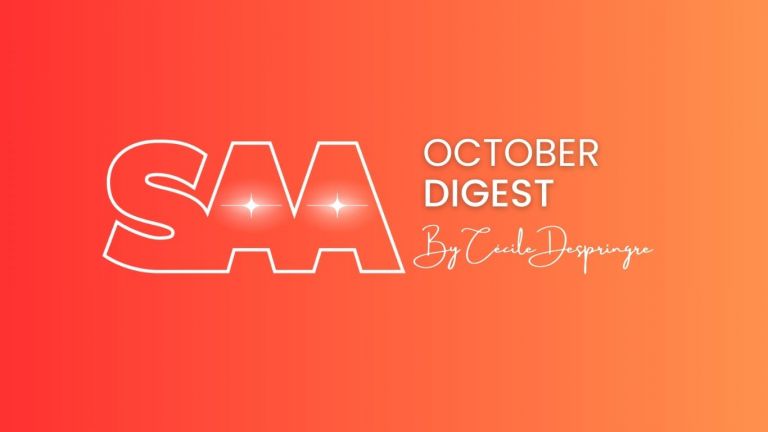Secretary General's October Digest, 2024

In October, I travelled to Budapest and Warsaw, organised two working group meetings with the SAA members, prepared for our all-member meeting in Brussels in November and started introducing Luisiana, our new Policy and Legal Officer, to the copyright experts in the Permanent Representations of the Member States.
Discussing Generative AI and copyright
Generative AI and copyright remain the main topic of discussion among stakeholders, EU institutions and Member States.
Member States received a questionnaire from the Hungarian Presidency of the Council of the EU addressing the training of AI models, the protection of opt-outs, transparency, remuneration and liability. In December, the Presidency will produce a report based on their discussions in the Working Party on Copyright and written comments received. The SAA provided comments to its members so they can address their national authorities, and we have started talking with the countries’ Permanent Representations to the EU in Brussels to share our position. This is also the perfect occasion to introduce my new colleague Luisiana to the copyright, audiovisual and culture experts of the Member States in Brussels.
The Hungarian Presidency also organised a Conference on Intellectual Property in the Age of Artificial Intelligence in Budapest that I attended. The panel discussion on remuneration was disappointing, with the international music and audiovisual producers continuing to reject statutory rights to remuneration for authors and performers, even though this is the only way to guarantee them remuneration for the exploitation of their works when collectively managed, especially in the streaming environment. I was however pleased to be in Budapest to meet our Hungarian member, Filmjus and one of our Patrons, László Czető Bernát.
This month I also presented the SAA's activities on AI to CISAC members on two occasions: at the meeting of the Legal and Policy Committee in Warsaw and to the Technical Committee on Dramatic, Literary and Audiovisual Works (I participated online). CISAC is the international association of collective management organisations across all kinds of repertoire. The music sector is dominant (see their annual Global Collection Report: 89.8% of the global collections are music), it is therefore important to continue to exchange experiences and raise awareness of the specificities of audiovisual authors’ rights and their collective management. It is good to note that we are also working with CISAC to raise awareness of audiovisual authors’ rights at WIPO.
At EU level, the SAA joined forces with 23 other creators and rightsholders’ organisations to call for a meaningful implementation of the AI Act ahead of the Commissioners-designate hearings by the European Parliament next week. The open letter emphasised that the application of the AI Act should aim at achieving a healthy and sustainable licensing market that encourages responsible AI innovation and complies with core principles of fair market competition and remuneration for creators and rightholders, while effectively preventing unauthorised uses of their works.
Another initiative that we have signed is a global Statement on AI Training, which states: “The unlicensed use of creative works for training generative AI is a major, unjust threat to the livelihoods of the people behind those works, and must not be permitted”. Organised by the British composer and former AI executive Ed Newton-Rex, the statement has been signed by several rightsholders' organisations and creators. To sign the statement click here.
Defending the ability of Member States to develop their cultural and audiovisual policies
As I wrote last month, Netflix declared the war to the Member States who implemented the EU's Audiovisual Media Services directive (AVSMD) with an obligation by media service providers to contribute financially to the production of European works. By asking the Belgian Constitutional Court for the annulment of the decree organising this contribution in the French-Speaking region, Netflix is threatening all the other Member States’ systems in place and want to discourage the other countries to develop such cultural policies. The SAA, alongside with other Belgian and European associations of creators and producers, decided to join the case to defend the competence of Member States to develop their cultural and audiovisual policies as the case is likely to go the EU Court of Justice.
This case will take up a lot of my time and energy from now on, not only because of the amount of preparation, but also because it reflects an uninhibited strategy by global operators to reduce regulatory policy in Europe, that we need to address.
Coming up...
This month my team and I have been preparing for our bi-annual meeting with SAA members in early November. We will present our achievements, share challenges and opportunities, and discuss what our priorities should be going forward. Two of our working groups also met in October (one on copyright and the other on retransmission). The SAA board will devote a full day to discussing the long-term vision of the organisation, with the help of a professional facilitator, in preparation of our next 3-year strategic plan. A lot has happened since then and the environment for authors is different from it was just a few years ago!
At the same time as our members’ meeting, the European Parliament will be starting to hold the hearings of the Commissioners-designate. We are paying a particular attention to the hearings of the Executive Vice-President Henna Virkkunen for Tech Sovereignty, Security and Democracy (supervising copyright and audiovisual policy) and Commissioner Glenn Micallef for Intergenerational Fairness, Youth, Culture and Sport.
I wish you a not-too-dark and not-too-cold month of November ????
Yours sincerely,
My 3 reading tips
- AI in the Audiovisual Sector: Navigating the Current Legal Landscape, European Audiovisual Observatory
- Former OpenAI Researcher Says the Company Broke Copyright Law, The New York Times
- State of Culture report, Culture Action Europe
